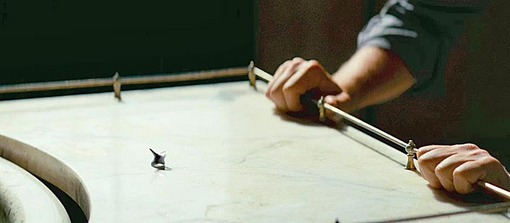Quite a few reviews of “Inception” noted that its multi-leveled dreamscapes resembled those of video games, with each new level getting the players deeper into the gameworld and closer to mastering the key task, which is ostensibly to implant an idea in someone’s brain. Now, usually when a critic compares a movie to a video game it’s meant to be a slight, but in “Inception” the similarities are so apparent that it would have been irresponsible to ignore them.
Ty Burr (in a generally appreciative column, for those of you to whom that kind of thing matters most), wrote in the Boston Globe:
Crucially, “Inception” never establishes — or even wants to establish — a waking reality that would make the death of Cobb’s wife hurt the way it’s supposed to. Ironically, I connected more emotionally with Marion Cotillard’s Mal, a dream abandoned by her dreamer and filled with the rage of Medea. Her name carries an echo of mal-ware, which makes me wonder if Nolan might be a better writer of code than of human beings. Certainly “Inception” unfolds at times like genius software, revealing new apps and ideas with each push of the movie’s buttons and ours.
So perhaps it was inevitable that gamers themselves would weigh in on the movie’s strengths and weaknesses in this regard. Kirk Hamilton, the editor of Gamer Melodico, in a piece republished at Kotaku (“Inception’s Usability Problem“) says that while watching the movie he found himself thinking about videogame tutorials:
For those of us in the gaming set, one of the coolest things about Inception is its narrative set-up. Here is a videogame movie that isn’t based on a game, it’s simply… a videogame movie. In other words, rather than adapting an existing game’s story a la ‘Prince of Persia’ or ‘Hitman,’ ‘Inception’ presents an original story built on the fundamental tenets of videogames. It’s a tale of people transporting their consciousness into a construct where notions of life, death, time and identity become quite different than in the waking world. So I suppose it’s appropriate that the film’s biggest shortcoming feels so fundamentally game-y in nature.
I found Inception’s script to be an overwhelming stream of unfettered information the likes of which would be inexcusable in a modern-day videogame. For the entire run of the film, characters do nothing but deliberately, forcefully explain and expound upon the ever-more-complex rules and systems that Nolan has designed, leaving the audience no room to actually internalize any of it. Forget about fleshing out characters, establishing the plot and making the audience care about what’s happening onscreen — Nolan seems far more interested in giving us a harried, unending crash-course in metaphysical dream navigation, usually delivered on-the-fly and always accompanied by Hans Zimmer’s relentlessly driving musical score.
(I’m still wondering whether all those rules ultimately put too many limitations on what the movie could do with “dream worlds,” cramping its visual imagination rather than expanding possibilities.)
Hamilton makes illuminating comparisons to other mindgame movies (“The Matrix“) and heist movies (“Ocean's Eleven“), too:
Compare [the first hour] to the opening scenes of one of “Inception”‘s clearest spiritual ancestors, 1999’s “The Matrix.” During that film’s first 45 minutes, the Wachowski brothers showed us their universe with no exposition at all. It worked, and the reason it worked was that it was executed in such a clear and elegant fashion that once we did know what was going on, those earlier scenes were reborn in a new light and greatly informed the scenes we were currently watching. The importance of the red-pill moment cannot be overstated — beyond the exhilaration I felt when I finally learned what “The Matrix” was, I was also able to retrospectively construct my own understanding of how it worked. I understood how Trinity was able to take out those cops, why she ran for the phone, why she was so afraid of Agent Smith and how she escaped the dump truck. I understood where Morpheus’ voice was coming from and how he was able to guide Neo through the cubicles. The mythology of “The Matrix” was no less complex or heady than that of “Inception,” but its core mechanics were demonstrated and then explained with far greater economy and clarity.
That kind of “reverse ah-ha” is also what good heist films are made of. In “Ocean’s Eleven” (another of “Inception”‘s clear influences), part of the fun of the movie was that we the audience weren’t quite sure about the particulars of Danny Ocean’s plan. We knew the basics as we watched the crew go about their various tasks around the casino, but it wasn’t until the film’s final fifteen minutes that we finally saw how it all came together. A good heist film should do just that — strike a balance between letting its audience in on the plan and playfully misleading them so that the eventual reveal (the “prestige,” if you will) is both unexpected and retrospectively comprehensible.
What Hamilton is describing has a lot to do with good storytelling — presenting the viewer with information in such a way that it comes together without having to be explicitly explained. It’s fun engaging, and (I’d argue) more satisfying than being lectured to (even when your audience-surrogate is played by Ellen Page).
(Thanks to Jake Barksdale)











